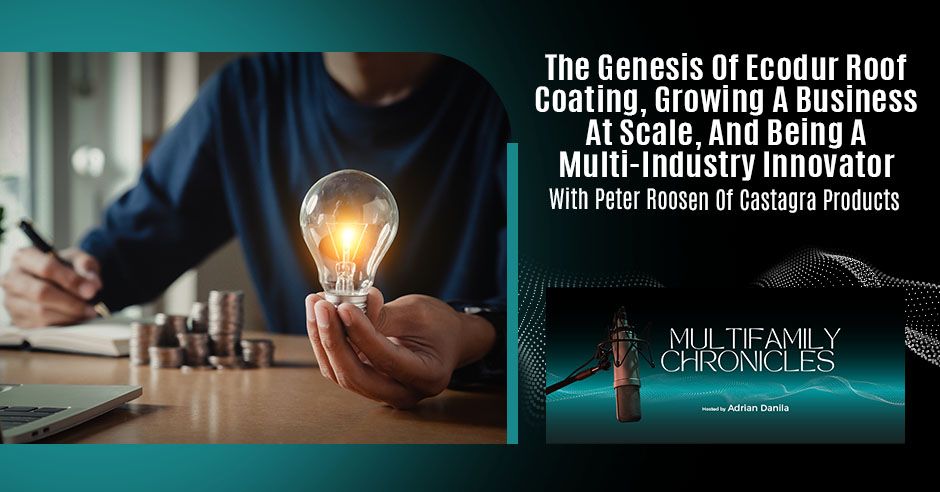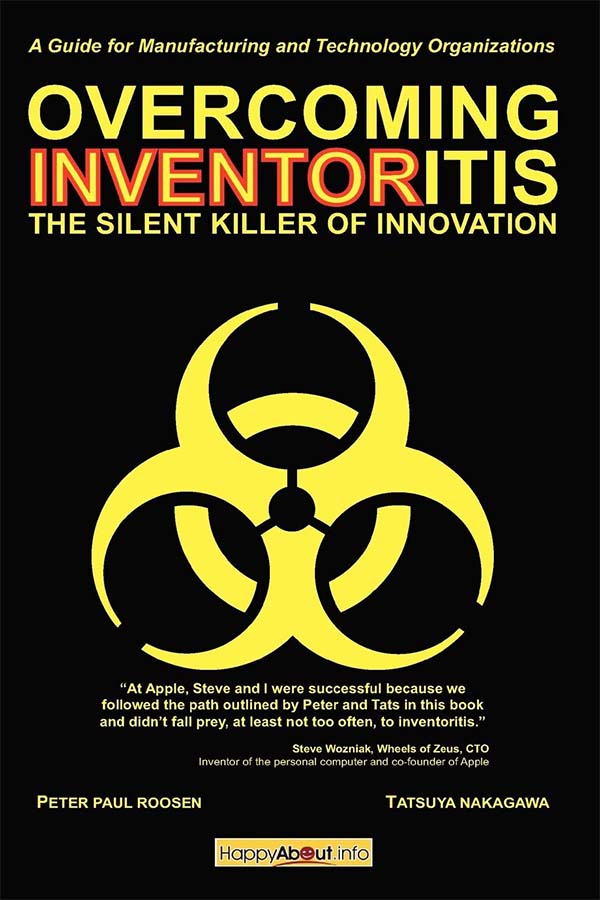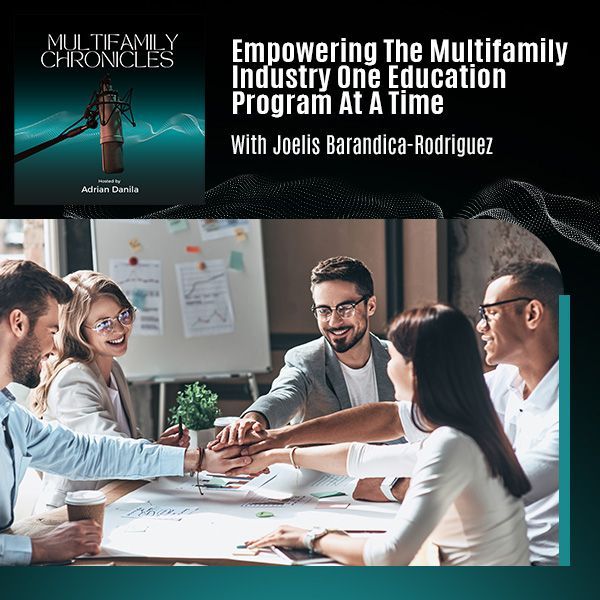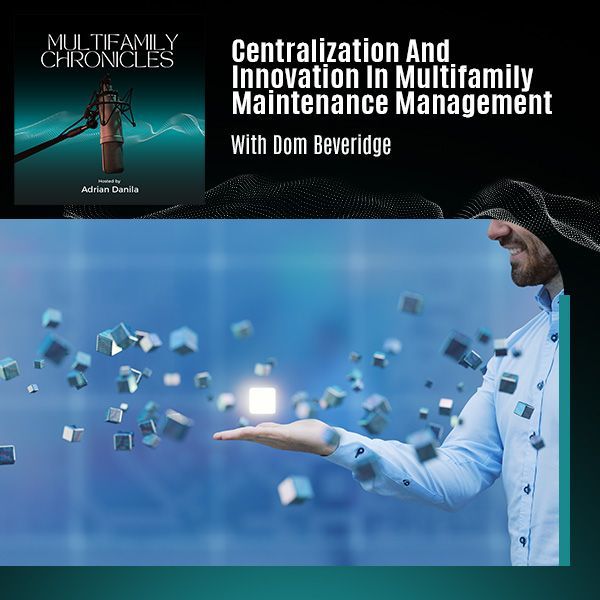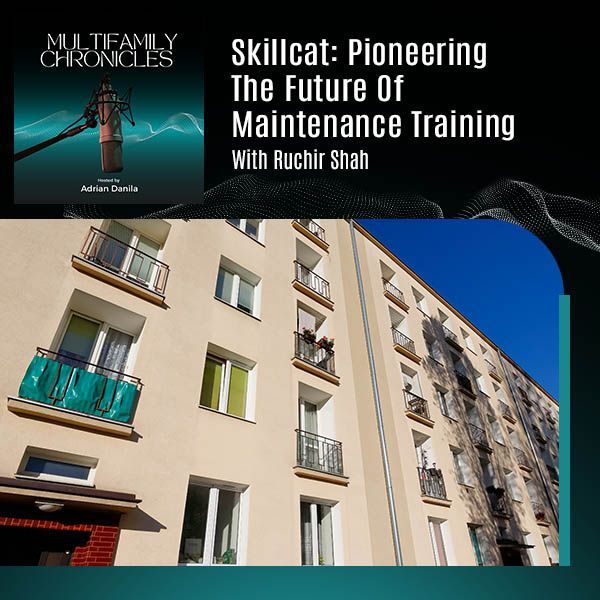The Genesis Of Ecodur Roof Coating, Growing A Business At Scale, And Being A Multi-Industry Innovator With Peter Roosen Of Castagra Products
Ecodur Roof Coating is used by some very well-known companies like General Mills, Tyson Foods, NFL and McDonald’s. What makes this product so special? Joining Adrian today is no less than the product’s inventor, Peter Roosen. In this conversation, Peter shares with us how he came up with the concept of Ecodur and how he and his team at Castagra Products brought the product to market dominance. Peter also shares his jab on what it takes to be a successful entrepreneur, taken from his years of experience in bringing out products that are ahead of their time. Plus, Peter shares some key lessons from his book, Overcoming Inventoritis. Tune in for all these and Peter’s golden nuggets on how founders can foster innovation and grow their businesses at scale!
---
Watch the episode here
Listen to the podcast here
The Genesis Of Ecodur Roof Coating, Growing A Business At Scale, And Being A Multi-Industry Innovator With Peter Roosen Of Castagra Products
My guest on this episode is Peter Roosen. Peter is the Cofounder, President, and Board Chair of Castagra products. He's also the inventor of Ecodur Roof Coating. Welcome to the show, Peter.
It’s great to be with you. Thanks for inviting me.
The first question that I want to ask is about the Ecodur Roof Coating product. It's used by very well-known companies at scale: General Mills, Tyson Foods, NFL, and McDonald's. What makes this product special? What are some advantages of the product being used for roof coatings?
It falls into a couple of areas, but what's interesting is when I developed this product, I developed it many years ago in the early-1990s with sustainability being an important requirement. Not an option, but a requirement. That was a little bit early. It took a little while for the market to catch up with this idea, then here we are 30 years later talking about the same things.
Former cleaning companies are much more interested in this. However, sustainability on its own doesn't cover the whole thing. It still has to be as good or better than the things that are out there. It has to be economically sensible and practical. Better, faster, and cheaper still wins, but we need to be sustainable. We are no longer cheaper. That's interesting. People are willing to pay a little bit more for having these extra premium things within the product.
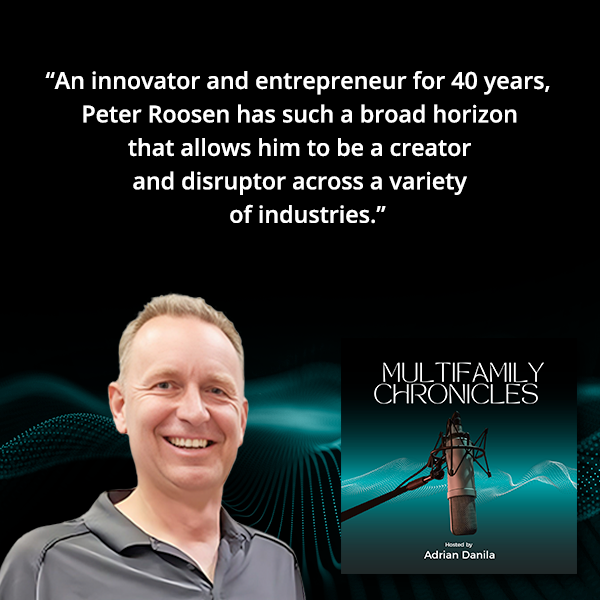
How did you come up with the idea to develop this product? What was the spark that made you think, "I'm going to develop this new product?"
No surprise to a lot of people that have been through these sorts of things. The path was a little bit bumpy. It originally started with a friend of mine who's from Austria. He was a master finishing carpenter. He was doing these spiral staircases in big houses, and so on. He says, "I had already sold a previous business because I wasn't doing much. Can you come up with some plastic that will go around the curve wall instead of wood? It takes me forever to cut pieces of wood, steam them, laminate them, and do all these things."
At the time, I said “No, I'm not interested. Plastics are evil. I want nothing to do with them.” The world is filling up with all this stuff, and I want to work on other things that are more in the direction of the future. He was like so many of my friends from Eastern Europe and Austria. He was persistent. For six months, every time we get together, he would say, "I still want you to do that thing for me." Finally, I said, "Okay. Shut up. I will have a look." It was a six-month deep dive. What I was researching was all of the things that go from the long past in coatings, plastics, and wood finishes.
These were all made with natural products. Benzene oil, tall oil, castor oil, and whale oil which is not a sustainable thing, but at the time, these were natural things. I researched everything I could on that. I'm from Europe, so I was doing a lot of studying German literature as well. I took that old technology, combined it with modern technology, and came up with something unique.
That's not roof coating, that's curved moldings that roll up in a box and go up and down spiral staircases for curve walls and buildings. I built that business up. Sold it out. Eventually, it's now part of Weyerhaeuser, so I got out of that aspect many years ago. How it got onto roofs was our old factory. We were renting an old building in a shipyard in North Vancouver, British Columbia.
We always had these leaky roofs. The owner of the building wouldn't fix anything, so the guys in the plant say, "Go up there with a bucket and throw it on there and see what we can do." It held well over the winter. At the same time, they were taking these same buckets and going around to the ships to make repairs because we were surrounded by ships, fishing boats, and personal boats. It turned out to be a really good all-weather coating for roofs and boats, and it grew from there.
It's a very fascinating story. You have founded numerous companies in various industries. What does it take to be a successful founder and successful entrepreneur, in your opinion?
Friends of mine tell me this, too. One, in particular, had a great insight. He says, "You have a definiteness of purpose." I thought it was interesting. That covers a few things. That incorporates this idea of having goals and things written down. I still use an old-fashioned notebook. I have been doing this for so many years. I always take notes. Now, we use technology.
I write these notes by hand, and then I scan them at the end, so I don't have boxes full of these books anymore. I do a lot of writing, setting goals, and all that's part of it. When something needs to be done, it needs to be done. That's setting out the purpose and whatever it takes to accomplish a task at hand. If something is going in a negative direction like it's not working, then you have to assess it, look at it, and kill it so it doesn't kill you. That's part of the sorting process. Having a definiteness of purpose about what it is that you are trying to accomplish, that's extremely important.
It’s extremely important to have a definite purpose. You have to know what you’re trying to accomplish.
Which company that you founded would you say is your all-time favorite and why?
There were two. Castagra is one of them. I have always had a passion for things to do at the railroad. I'm born in Switzerland. I think my father had train sets in the house. Before I was born, he was doing this thing. Switzerland is full of trains that go up and down, fast and slow. Developing the newer generation of railroad locomotives was with the younger ones.
I have always loved material science and engineering. My engineering degree is in Mechanical Engineering, but I have always been fascinated by chemistry and products. Think about it, everything is made with chemistry. There's nothing we use that doesn't use chemistry. I have always been fascinated by materials. At the university, I had one instructor or professor who was head and shoulders above the rest when it came to the passion for the subject in that chemistry material science area. Those are my two favorites. The locomotives and Castagra. They all have different names, but the railway locomotives and the materials side. Those are my two favorites.
I want to ask you something about scaling. What was the largest number of employees you scaled the company to, and if you want to mention the company name as well?
In the Castagra business, we have six full-time salespeople. We are adding another one on the sales side. On the production side, a lot of that is done through contracting, but it's about 100 in there. In the locomotive business, it was about 450 at a certain point during that side. It got reorganized, spun, and sold but those are the things.
This is a tough one because of what I manage directly and what other people and affiliates manage, and sometimes the lines get a little bit blurry. For instance, a previous version of the materials company is a company called ACUFLEX, which got sold into what eventually became Weyerhaeuser. Weyerhaeuser is a massively big company.
After a while I hated it. It was too big, and then I wasn't doing cool technological things anymore. I was going through everybody's budgets. That drove me insane because I'm not an accountant numbers guy. I'm very numbers-oriented on the technical side, where it's interesting and relevant, but once it's just a day-to-day operating entity, my interest falls away for sure.
What would be a number one practical piece of advice that you would have for a founder that wants to grow their business at scale?
Whatever is that you are going to do, make sure there's a market that's scalable. For instance, the previous company and the Castagra company in the molding side, that market was a little bit limited. Weyerhaeuser through other technology, we are using it to start coding engineered wood products. The moldings market's a little bit limited.
What I love about roofing is the volumes are astronomically huge. In the railroad business, there are only about 30,000 locomotives in the whole United States, so your addressable market is 30,000. What's the addressable market in roofs? The number is so big, you can't really count it. It’s in the many billions of square feet. That's every year. Find out a market that's big. A key part of it is to make sure it's something you care about that you are interested in. You have to get up early and be excited about whatever it is. Be able to get up every morning excited about what the day will bring.
I'm a big believer that meaningful work makes all the difference. No matter what you do. It could be an entry-level job, mid-management, a founder, or anything. As long as you find meaning in it. Don't you agree?
Absolutely. What I tell people, too. I have got grandkids that are just getting started. One of them works at a gas station for one of the big grocery stores. I say, "Whatever you are doing there, be interested, passionate, and excited about it. You will find that opportunities come out of that within the company. Become the person you want to be wherever you are, and then you can shift around and do other things." Right now, the customers notice him. He wanted to leave, they gave him a little raise so he wouldn't go. I say, "If you want to pump gas the rest of your life, be the absolute best person on the planet pumping gas. Carry on." Take that attitude into whatever it is. We are both on board with that idea.
You have received many patents on steelmaking measurements, railroad technologies, and then vegetable oil-based plastics. They are widely used in construction and engineering applications. It was very hard for me to understand before starting the conversation. These inventions are in fields. They are so many different from each other. How could one single individual have such a broad horizon, and then be able to excel and be a creator, to create and to have patents in all these varieties of industries?
There are two sides to that. Every time you get a business to a certain size and you make a deal with somebody, it has a non-compete. My suggestion is to have something going on in an area that's way over here, and then something else over here. Most businesses have about a five-year cycle. Some slower, some longer. When you sign that non-compete, it's like, "Fine. I'm out of the way. I'm over here in a completely different area. I never take a day off." That's one of the things that helps.
The other side of that is, I'm very much a student of the sciences. The common language is math. It ties all the things together. When working on something very physical, whether it's a railroad locomotive. It's a power plant on wheels because we have diesel electricity as our technology if we are using diesel engines. If we are using hybrid fuel cells or other things, there's a lot of electrical engineering involved. Those electrical principles follow through.
In material science engineering, math is the same. Maybe not the same equations, but the approach, the scientific create a theory, do some experiments, and see what results you get. That's very much the same as if you are red-boarding on an electrical thing or working out a stress test on a heavy mechanical piece of equipment. For me, it's the same in many ways.
I wanted to ask you about an invention that goes back a long number of years. You were a part of that invention. Although at the time, probably not so many people knew about it, right now it became one of the most famous software in the world. That's Windows Media Player. Would you like to share with the audience a little bit of a background on how did that happen?
The product that I developed with our little group at the time in North Vancouver was a product called Flip Screen. What we were doing was, at that time, in 1990, very early computers as far as personal computers were very limited. The amount of RAM and the speed of the processors, it's minuscule compared to what we have now.
What we did at the time, we develop the first full-motion video that did not require special hardware. We could run these things on early personal computers. That was a big deal. We had to be very efficient with our algorithm. The mathematical method of compressing and decompressing a video, we pioneered that.
It's interesting that that is now basically the Windows Media Player. There were NDAs in place at the time, and I'm sure that if I dig back far enough, I can find one. Those have expired surely. The court technology and the principles, we established them. Again, it's a discovery process. We found the most efficient way of rendering video and had to because it was so necessary.
Nowadays, the ability to process that information is vastly improved. Even now, I had to move from my house over to here because the internet connection was too poor where I am up in the mountain. It's still important to have efficient video processing. It hasn't changed that much since back then when we developed that.
There's a little bit of a funny story in there, too. We presented it at COMDEX, which is a big computer developer at Expo in Las Vegas. I think they still have that show on every year now. It's a huge trade show. People from Microsoft, we invited them. They came to our booth and saw the demos. It was a three-day show.
On the second day, for lunch, we had an opportunity to visit with Steve Jobs. He was very big in his next step in that aspect of developing his own computer over at Apple. We had that lunch thing in his hospitality suite. It was nice and everything, but I found him a little bit artsy. To use the term, it's not a nice thing necessarily, but he was a little bit out there, from my point of view.
I'm a little bit more analytical, maybe less now than I was then. I was a pretty square-headed guy at the time. For dinner, we had dinner with Bill Gates. He was only a billionaire then. He wasn't a zillionaire as he is now. At the time he says, "We looked at your thing. Now that we know it's possible, we know that we have a path to get there. I'm going to make you an offer and you will probably accept it. If you don't, you know that I'm going to come up with the same solution, because it's important that we have this capability."
He made the offer and we did accept it. It was interesting. The funny part was, I told everybody, "Do not talk about Steve Jobs at Apple when we were over with Bill Gates and vice versa." Those two guys weren't best friends, but they were always aware and interested in what the other was doing. They certainly had their own businesses and their own plans.
It was exciting. Ultimately, I did not like that business and did not want to stay in that business because it was too fast. Every day I had to get up and think, "What's the next guy behind me doing? When am I going to get leapfrogged?" The clock in the tech world is marked in nanoseconds. I was too nervous. I'm a little bit slower. That's why I went back to playing with trains and building materials because I got my nerves back.

Too fast-paced.
It was, and I think it still is.
Probably more than ever, if I had to guess. You are the co-author of a book called Overcoming Inventoritis: The Silent Killer of Innovation. What is inventoritis and how does it kill innovation?
Inventoritis is what happens if you fall in love with your idea. Love is blind. That's the idea there. The book, Tatsuya and I co-wrote it out of a place of pain. We had a consulting practice, a marketing consultancy. We were doing all kinds of sports marketing and product marketing. We had a steady stream of inventors, small businesses, and larger companies. Quite a mixed clientele. We started seeing common themes.
New Paragraph
One of the things that became pretty obvious is your typical passionate inventor. They are so in love with their idea and their technology that they focus too much inward. They don't handle criticism very well. It becomes a pathology of sorts. It kills the business. The book is titled Overcoming Inventoritis. We had to lay out steps to eliminate that problem. That was done many years ago. Our thinking has evolved from that, but that basic premise still holds. If you fall in love, you become blind to things that you should be very much aware of as you are developing your business from your idea.
From someone as successful as you have been in your career, what one piece of advice would you have for the younger generation that's ready to go out in the world? They are graduating high school or college, they are ready to go out in the real world, be on their own, and make the best of it.
The meek do not inherit much in the real world. I'm a bit of an Asperger's kid. I have always had that issue. I had to make a lot of effort to get better at communicating, to be able to use these tools and to not be shy about it. Work on becoming as competent a communicator as you can. That's very important because what's our main job if we are running a business? It's selling, sharing the vision, and seeing people.
The meek do not inherit much in the real world.
For me, that's not natural. I'm good at it. I'm good enough anyways, but I had to be definite about doing these things, so I joined Toastmasters. I went through high levels within the organization that took several years period. Focus on communication. That's a key leadership skill. That would be my number one. At least it was for me. That was the thing that I had to overcome over many years, and I'm not done with it either.
It's an ongoing process.
Yeah. I think that's number 8, and there are 12 ways to overcome inventoritis. Focus on the process.
How did a failure or apparent failure set you up for future success in your career?
I don't think in terms of one, failure is very much a part of my process in developing these roofing materials. I go back to the Thomas Edison story where he had to go through 10,000 different filaments to come up with a suitable light bulb. I'm very much a fan of that approach.
To come up with the right combinations of things to make these different products on the material science side, I have done tens of thousands of experiments to get to the result. The vast majority of them fail. You try something, that didn't work. What did we learn from it? Why didn't it work? Where can we improve on it?
I had some big ones, too. We were trying to put together a battery railroad locomotive for the ports of Los Angeles and Long Beach. The lithium-ion technology was a little bit oversold. We had a locomotive. We already had brought in about a third of the batteries. We paid some $400,000 for the battery, we only need to get a third of them. We started taking measurements. I go, "We are not getting the numbers that we need.” By the time that all got done, that's a few million dollars of like, “We never got that locomotive in service. I can sell you some batteries at a discount if you have a need for some. They're not that good, but I can give you a good deal on them.”
Does that mean that we are done with battery technology? Not at all. For instance, there's a lot of excitement about the iron-based battery technology that could take over a lithium-ion. There are wonderful new technologies out there. I'm constantly keeping abreast of what's coming. That was a big failure but we learned from that because that becomes useful for going forward.
If you could think of one belief, behavior, or habit that you had to change that impacted your life in a more significant way, what would that be?
Get better at seeking objective truth. It's interesting, especially at this time now. There's a lot of reliance on fake truths and this is not acceptable. It doesn't work in the scientific world. The laws of nature are there to be discovered, observed, and measured. I had to improve upon this, the battery example was exactly that. Where I had to measure and find that the scientific truth was not at all what lined up with the truth that was coming from the salespeople who are selling us these things. That's something that I had to sharpen very much.
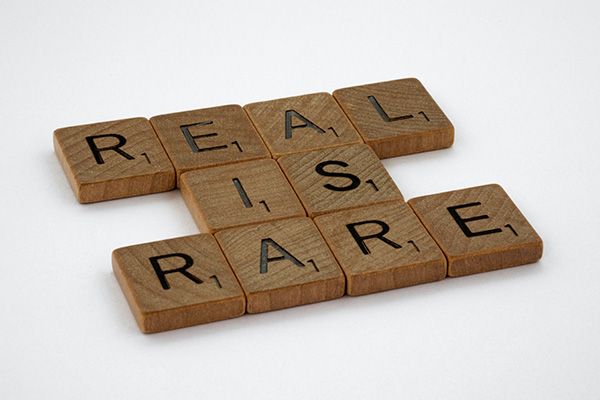
Our conversation is about to come to an end. Is there a topic or a question that you wish I would have asked, something that you wish we would have covered during our conversation and we didn't?
I think you covered a wide variety of topics. I'm reaching out if there's something else. I guess you could ask me for a prediction as to what the world will look like a few years from now. I'm very much optimistic. The world has challenges, but the future is still bright. Maybe I will go in that direction.
Thank you so much for accepting my invitation here. I appreciate and enjoy our conversation. I hope that maybe later down the road, you would agree to come back for a second episode because it's fascinating.
I don't do very many of these, but I do enjoy doing this. It is a pleasure to come out and visit with you. I hope that everybody reading got a little something out of this to help them go forward. That makes me feel good knowing that I'm helping others to get better. Whatever it is we are doing, we are growing, and that helps build that positive future that we are talking about.
That's the goal. Thank you again for coming. Everybody, thank you for reading. I hope to see you back here for more episodes. Have a great day.


